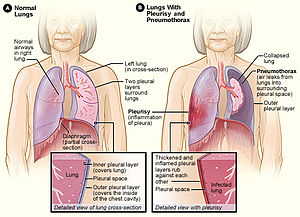Pleuritic chest pain
| Pleurisy | |
|---|---|
| Synonyms | pleuritis, pleuritic chest pain |
 |
|
| Figure A shows normal anatomy. Figure B shows lungs with pleurisy in the right lung and a pneumothorax of the left lung. | |
| Specialty | pulmonology |
| Symptoms | sharp chest pain |
| Causes | viral infection, pneumonia, pulmonary embolism |
| Similar conditions | pericarditis, heart attack, cholecystitis |
| Treatment | based on the underlying cause |
| Medication | paracetamol (acetaminophen), ibuprofen |
| Frequency | one million cases per year (United States) |
| Classification | |
|---|---|
| External resources |
Pleurisy, also known as pleuritis, is inflammation of the membranes (pleurae) that surround the lungs and line the chest cavity. This can result in a sharp chest pain with breathing. Occasionally the pain may be a constant dull ache. Other symptoms may include shortness of breath, cough, fever, or weight loss depending on the underlying cause.
The most common cause is a viral infection. Other causes include pneumonia, pulmonary embolism, autoimmune disorders, lung cancer, following heart surgery, pancreatitis, chest trauma, and asbestosis. Occasionally the cause remains unknown. The underlying mechanism involves the rubbing together of the pleurae instead of smooth gliding. Other conditions that can produce similar symptoms include pericarditis, heart attack, cholecystitis, and pneumothorax. Diagnosis may include a chest X-ray, electrocardiogram (ECG), and blood tests.
Treatment depends on the underlying cause.Paracetamol and ibuprofen may be used to help with the pain.Incentive spirometry may be recommended to encourage larger breaths. About one million people are affected in the United States each year. Descriptions of the condition date from at least as early as 400 BC by Hippocrates.
...
Wikipedia
